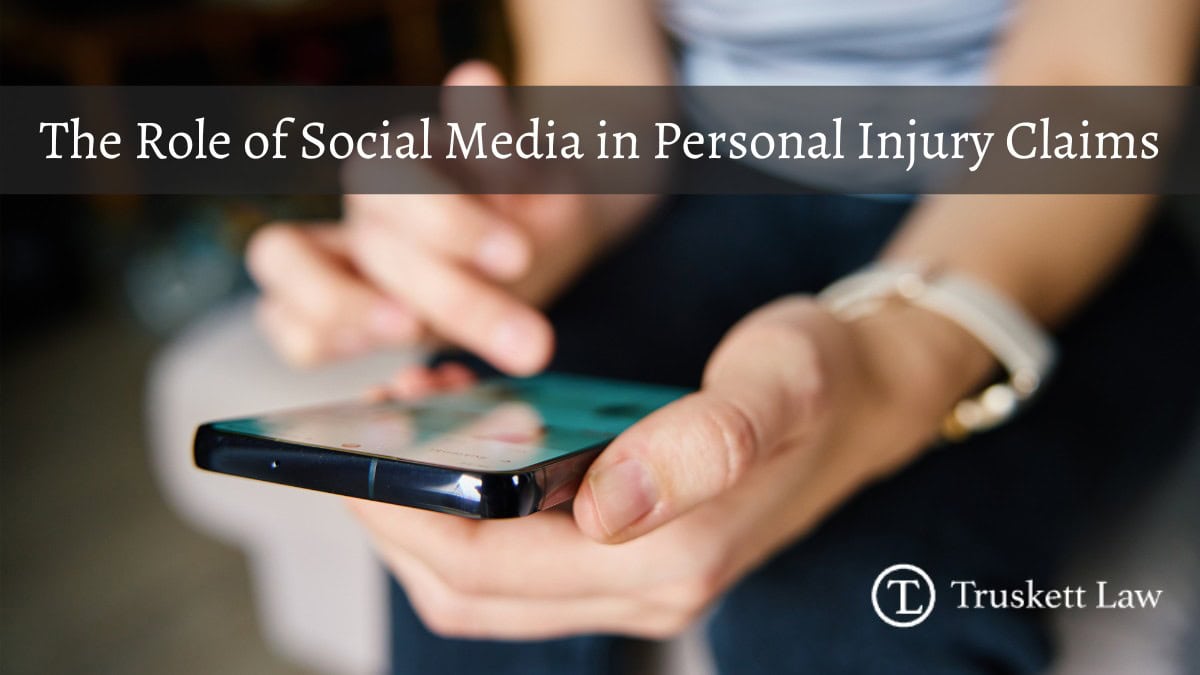
13 Feb The Role of Social Media in Personal Injury Claims
Personal Injury Claims and Social Media: What You Should Know
In today’s digital age, social media has become an integral part of daily life, offering a platform for individuals to share their experiences, stay connected, and express opinions. While this can be an excellent tool for personal expression, it also presents new challenges, particularly when it comes to personal injury claims.
If you’ve been involved in an accident or suffered an injury, it’s essential to understand how social media can impact your case. What you post, who you interact with, and how you use these platforms can influence the outcome of your claim, potentially affecting the compensation you receive or even the success of your case.
Here’s a look at the role social media plays in personal injury claims, how it can help or hurt your case, and how to navigate it wisely.
Social Media’s Influence on Personal Injury Cases
When you’re involved in a personal injury case, one of the first things your attorney will advise is to be cautious about your online presence. Insurance companies, defense lawyers, and even opposing parties can easily access social media platforms like Facebook, X (formerly Twitter), Instagram, and LinkedIn.
This information can be used to build or challenge your case, sometimes in ways you might not anticipate. Even seemingly innocent posts or interactions can be scrutinized and twisted to undermine your credibility or damage your claim.
For example, if you’re claiming that your injuries prevent you from working or participating in certain activities, but you post photos of yourself engaging in physical activities or enjoying a day out with friends, this could raise doubts about the validity of your injury.
Insurance adjusters and opposing attorneys are adept at finding these inconsistencies and may use them against you in an attempt to reduce the amount of compensation you’re entitled to.

How Social Media Can Help Your Case
While social media can present risks, it can also play a positive role in your personal injury claim if used wisely. For example, social media can serve as an effective tool for gathering evidence that supports your case.
Photos, videos, and posts made by witnesses or others involved in the accident can provide valuable documentation that may strengthen your claim. In some cases, people involved in accidents unknowingly post information or images that can corroborate your account of the events.
For example, someone might share an image of the accident scene or post about witnessing the incident, which could be used to support your version of the events.
Social media can also help track your injuries over time. Many people naturally post about their experiences recovering from an injury, and these posts can show how the injury has affected their daily lives.
This can be beneficial in demonstrating the pain and suffering you’ve endured, as well as the impact the injury has had on your ability to work or enjoy life. For instance, photos that highlight your rehabilitation process, hospital visits, or the emotional toll of the injury could offer significant evidence for your attorney.
Social Media Risks in Personal Injury Claims
On the flip side, social media can be a double-edged sword, especially when it comes to personal injury claims. One of the primary risks is that your posts may be misinterpreted or used as evidence to challenge your credibility.
For example, sharing images of yourself participating in activities like running, hiking, or playing sports – activities that contradict the severity of your injuries – could harm your case.
It’s also important to remember that even private accounts aren’t necessarily off-limits. If you’re involved in a lawsuit, the opposing party may request access to your private social media accounts during the discovery phase.
While this is a legal process that requires approval, it still highlights the importance of being cautious with what you post, even in private settings.
Additionally, emotions can sometimes drive people to vent or share frustrations online, but anything you say can be used against you in court. For example, if you post negative comments about the other party involved in the accident or complain about your injuries in an exaggerated way, it could harm your case and make you appear less credible.
Tips for Managing Social Media During a Personal Injury Case
Given the risks, it’s essential to manage your social media presence carefully while your personal injury case is ongoing. Here are some tips to help protect your claim:
- Limit Your Posts: One of the best ways to protect your case is to limit your social media activity during your claim. You don’t have to deactivate your account, but consider avoiding posts, photos, and updates about your personal life while the case is ongoing. The less you share, the less ammunition there is for the opposing party to use against you.
- Avoid Sharing Details About the Accident: Refrain from discussing the specifics of the accident on social media, including your injuries, what happened, or your emotional state. Anything you say could be misinterpreted or taken out of context, so it’s better to keep the details private and share them only with your lawyer or other trusted individuals.
- Don’t Post About Your Recovery: Although it might be tempting to post about how well you’re doing in your recovery, it’s important to remember that these posts could be used to contradict your claim of serious injuries. For example, if you say you’re in constant pain but post a video of you attending a party or walking around without visible signs of discomfort, it could be used to challenge your claim.
- Adjust Privacy Settings: While nothing on the internet is completely private, you can increase your privacy settings on social media platforms. Ensure that only trusted individuals can view your posts and consider adjusting your privacy settings to make it harder for people you don’t know to access your personal information.
- Be Careful with Tags and Mentions: If others post about you on social media, you might not be aware of what’s being shared. While you can’t control everything others post, be mindful of who tags you in photos or mentions you in posts. It’s best to ask friends and family to avoid posting content related to your accident or your recovery.
- Consult With Your Lawyer: Before posting anything related to your accident or injury, consult with your attorney. They can guide you on what’s safe to share and help you understand the potential implications of your social media activity. If you’ve already made posts that might be detrimental to your case, your lawyer can advise you on how to handle the situation.
The Importance of Working with a Personal Injury Lawyer
If you’ve been injured in an accident, working with a personal injury lawyer is crucial to the success of your case. A lawyer can not only provide you with legal expertise but also help you navigate the complexities of your case, including handling social media risks. They will guide you on what to share and ensure that you follow the proper legal steps to protect your rights.
Moreover, an experienced personal injury attorney will know how to deal with the insurance companies and opposing lawyers, ensuring that your best interests are always at the forefront.
They can also help collect and preserve evidence, including social media content, and use it to strengthen your case. Your lawyer will be there every step of the way to help you achieve the compensation you deserve, from the initial claim process to negotiating a fair settlement.

How Truskett Law Can Help You Navigate Social Media Risks
Social media has undoubtedly changed the way we connect and share our lives, but it can also have a profound effect on personal injury claims. While it can serve as a valuable tool for collecting evidence or documenting the impact of an injury, it can also be used to undermine your case if you’re not careful.


Sorry, the comment form is closed at this time.